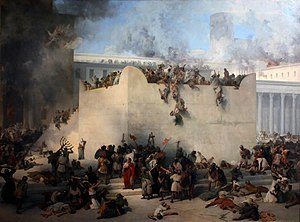 Continuing from Eddy and Boyd (2) . . . .
Continuing from Eddy and Boyd (2) . . . .
The argument that 1 Thess. 2:13-16 is an interpolation generally includes the claim that the passage refers to the destruction of Jerusalem in 70 c.e. — some years after Paul’s time. The last line of this section is
. . . . But wrath has come upon them to the uttermost (or ‘at last’) (1 Thess 2:16)
1st E&B argument
Eddy and Boyd, in The Jesus Legend, attempt to argue for the genuineness of the passage by denying this would have originally referred to the destruction of Jerusalem:
There is no reason to assume that the reference to God’s wrath overtaking the Jews refers to the destruction of Jerusalem. . . . It is not even clear that the reference to God’s wrath must be understood as an observable event in history. (p. 213)
E&B appeal to Romans chapters 1 and 9 (and again to a passage in 2 Thessalonians, a letter that is also strongly argued as being a forgery) to suggest that the wrath of God might simply mean that He has abandoned them to ungodly behaviour and delusion.
2nd E&B argument
But if the passage does refer to a specific event, they claim that it could refer to the expulsion of the Jews under Claudius in 49 c.e.
So E&B fail to argue a case themselves. They merely point to a couple of contradictory views and in effect say,
Take your pick. Pick any weakly supported solution we can think of so long as it denies the passage is a post-Pauline interpolation. And oh, by the way, we are not going to even repeat for you the arguments of those who insist it refers to the destruction of Jerusalem. Why bother if we can think up anything that says the passage is genuine? We don’t want to confuse you with the details.
One wonders if E&B have any idea (or if they even want to know) what it means. If the reader doesn’t like one explanation, then give them a choice so they can take one they are comfortable with. They outline no real argument for or against either conclusion. This is hardly making a “case for the historical reliability” of Jesus or the purity (no interpolations) of our Pauline letters.
3rd E&B argument
They also assert that the phrase “at last” or “to the uttermost” literally means “to (or until) the end”, and one can think of this meaning paralleling Jesus’ prophecy of future judgment at the end of the age. That is, E&B inform readers that the passage may simply mean that God’s judgment is on the Jews until the coming of Christ.
